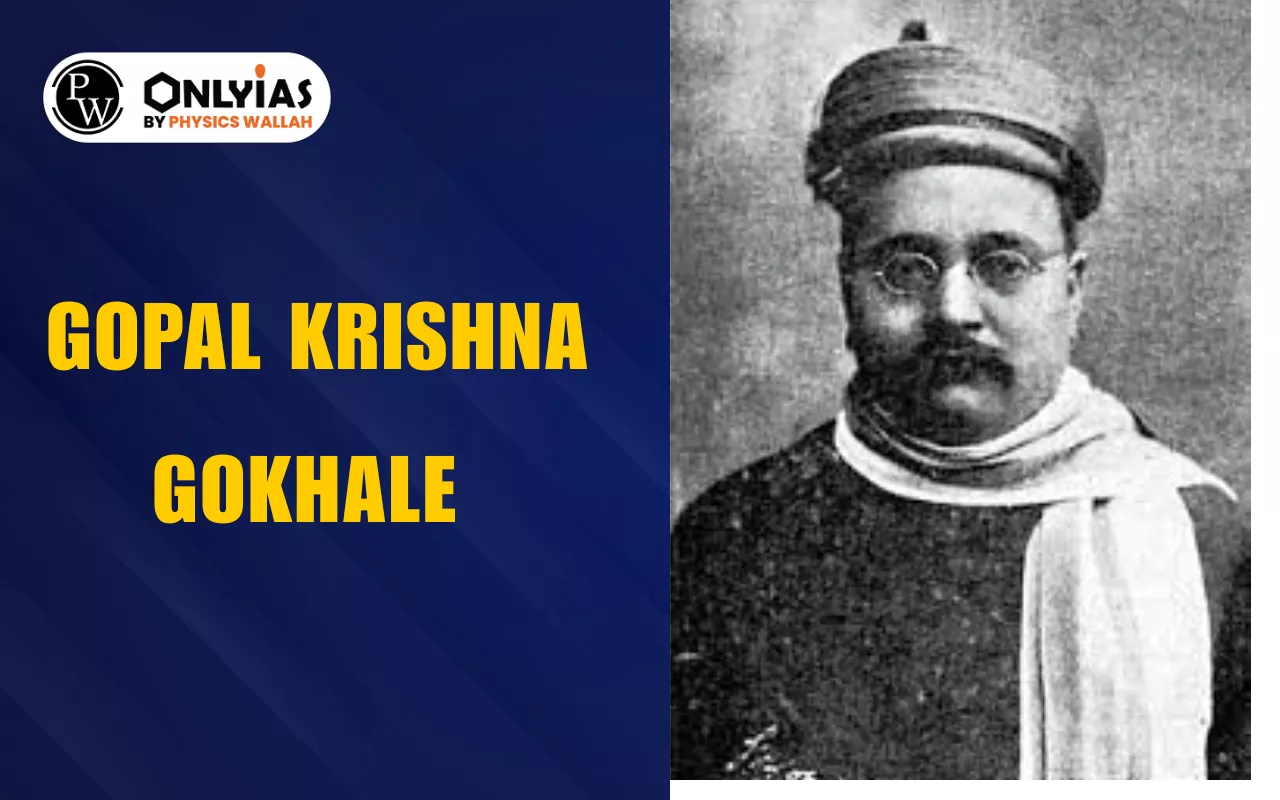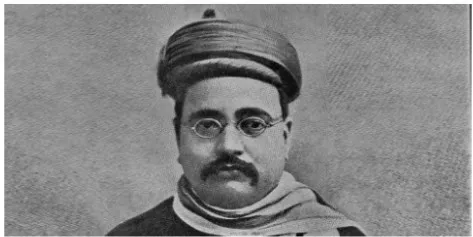Gopal Krishna Gokhale was a respected reformer, teacher, and political leader who promoted education, equality, and self-rule through peaceful methods. This Gopal Krishna Gokhale biography explains his early life, achievements, and contributions, including founding the Servants of India Society to inspire social and national progress.

Gopal Krishna Gokhale was a great Indian leader, teacher, and reformer who worked hard for India’s freedom. He believed that India could become free through peaceful talks and small, steady changes instead of violence.
Gokhale wanted to make people’s lives better by improving education, reducing poverty, and making society fair for everyone. He was also a teacher and guide to Mahatma Gandhi, inspiring many young people to serve the country with honesty and wisdom.

Gopal Krishna Gokhale was born on May 9, 1866, in Kotluk village in Ratnagiri district, Maharashtra. He came from a simple Chitpavan Brahmin family that respected learning even though they were not rich. Gokhale studied at Rajaram College in Kolhapur and later finished his degree at Elphinstone College in Mumbai in 1884. He was deeply influenced by Justice Mahadev Govind Ranade, who became his mentor and teacher. Ranade’s thoughts about reform, justice, and helping the nation guided Gokhale throughout his life.
| Gopal Krishna Gokhale Early Life | |
| Category | Details |
| Full Name | Gopal Krishna Gokhale |
| Date of Birth | 9 May 1866 |
| Place of Birth | Kotluk village, Ratnagiri district, Maharashtra, India |
| Parents | Krishna Rao Gokhale (father), Valubai Gokhale (mother) |
| Caste/Community | Chitpavan Brahmin |
| Education | Rajaram College (Kolhapur); Elphinstone College (Mumbai) |
| Mentor | Justice Mahadev Govind Ranade |
| Profession | Teacher, Economist, Social Reformer, Politician |
| Political Association | Indian National Congress (INC) |
| Key Position Held | President of the Indian National Congress (Banaras Session, 1905) |
| Legislative Roles | Member of Bombay Legislative Council and Imperial Legislative Council |
| Major Contributions | Advocated for education reform, free primary education, reduction of land tax, and Indian participation in governance |
| Founded Organization | Servants of India Society (1905) |
| Purpose of the Society | To promote education, civic responsibility, and national service among Indians |
| Major Publications | Founded The Hitavada newspaper to spread awareness and social reform ideas |
| Contemporaries | Bal Gangadhar Tilak, Dadabhai Naoroji, Lala Lajpat Rai |
| Death | 19 February 1915 |
| Place of Death | Pune, Maharashtra |
| Age at Death | 48 years |
| Famous Quote (by Tilak) | “He was the diamond of India, the jewel of Maharashtra, and the prince of workers.” |
| Legacy | Remembered as a moderate leader, reformer, and teacher who shaped India’s freedom movement through intellect and morality |
| Institutions Named After Him | Gokhale Institute of Politics and Economics (Pune); several schools and colleges across India |
After completing his education, Gokhale worked as a professor at Fergusson College in Pune, where he taught political economy and history. He was deeply inspired by Western thinkers like John Stuart Mill and Edmund Burke, who believed in democracy and individual rights.
These ideas encouraged Gokhale to think about how India could move toward self-rule through education and reform. His career as a teacher helped him understand the importance of spreading knowledge and awareness among Indians.
Gokhale joined the Indian National Congress in 1889. He soon became known as one of the moderate leaders, who believed that change should come through peaceful discussion and cooperation with the British government. He served in both the Bombay Legislative Council and the Imperial Legislative Council, where he spoke strongly for Indian rights.
In 1905, he became the President of the Indian National Congress during its session in Banaras. He always promoted unity and understanding, even when differences arose between the moderate and extremist leaders, such as Bal Gangadhar Tilak. Though they had different views, Gokhale respected Tilak and worked for national harmony.
Gopal Krishna Gokhale made several contributions that helped shape modern India:
| Area | Gopal Krishna Gokhale Contribution |
| Education | Worked to make primary education free and compulsory for children. |
| Social Reform | Opposed unfair land revenue systems and supported the upliftment of poor farmers. |
| Legislation | Advocated for more Indian members in legislative councils through the Morley-Minto Reforms (1909). |
| Labor Rights | Raised his voice against the exploitation of Indian laborers in British colonies. |
| Finance | Exposed how British spending policies burdened Indian taxpayers before the Welby Commission. |
Through his speeches and writings, Gokhale showed how India could progress with truth, equality, and self-reliance.
In 1905, Gopal Krishna Gokhale founded the Servants of India Society. The aim of this organization was to create a group of dedicated Indians who would serve the nation through education, reform, and moral leadership.
| Aspect | Details |
| Founded | 1905 |
| Objective | Promote education, civic sense, and national service |
| Activities | Establishing schools, libraries, and literacy programs |
| Legacy | Continued promoting social welfare even after Gokhale’s death |
The Servants of India Society played a major role in spreading awareness about the duties of Indian citizens and the importance of moral responsibility.
One of the most important relationships in Indian history was between Gopal Krishna Gokhale and Mahatma Gandhi. When Gandhi returned from South Africa, Gokhale guided him on India’s political and social realities. Gandhi described him as his political mentor and moral teacher.
Gokhale advised Gandhi to understand the people of India before starting any movement. Although Gandhi later took a different path by using non-violent resistance, he always spoke of Gokhale with great respect, calling him an inspiration for truth and service.
Check Out UPSC CSE Books
Visit PW Store
Gokhale’s achievements were not only political but also educational and social:
| Field | Achievement |
| Politics | Advocated constitutional reforms and Indian representation in government. |
| Education | Promoted modern and moral education for all citizens. |
| Labor Reforms | Fought against indentured labor and worked to end its exploitation. |
| Finance & Economy | Criticized British taxation policies and highlighted economic injustice. |
| Public Service | Founded Servants of India Society to train future reformers. |
Gokhale and Tilak were both patriotic but had different views. Gokhale wanted reforms through laws and discussions, while Tilak believed in direct protest and swaraj (self-rule). Their major disagreement came during the Age of Consent Bill (1891–1892), where Gokhale supported raising the age of marriage for girls, while Tilak opposed British interference in Indian customs.
Despite their political differences, they admired each other’s dedication to India. Tilak called Gokhale the “Diamond of India” and praised his honesty and wisdom after his death in 1915.
Gokhale also worked against the indentured labor system, where Indian workers were sent abroad under harsh contracts. In 1910, he helped stop migration to Natal and demanded a full ban in 1912. His efforts inspired later leaders to end the system completely in 1920.
He also helped found the newspaper The Hitavada (“The People’s Paper”), which promoted education and civic awareness. Through this platform, he spread messages of justice, equality, and reform.
Gopal Krishna Gokhale passed away on February 19, 1915, at the age of 48. His death left a deep impact on India’s freedom struggle. He was remembered for his calm leadership, intellect, and service to the country.
His legacy lives on through the Servants of India Society and his influence on Mahatma Gandhi’s philosophy of peace and reform. Schools, universities, and institutions across India continue to honor his name and work.
Ready to boost your UPSC 2026 preparation? Join PW’s UPSC online courses today!
Gopal Krishna Gokhale was an Indian leader, teacher, and social reformer who worked for education, equality, and India’s self-rule through peaceful means.
Gopal Krishna Gokhale achievements include founding the Servants of India Society, promoting free education, and supporting reforms in governance and labor rights.
Gopal Krishna Gokhale founded the Servants of India Society in 1905 to promote education, civic responsibility, and national service among Indians.
Gopal Krishna Gokhale contribution lay in using peaceful discussions, reform, and education to guide India toward self-rule.
Mahatma Gandhi considered Gopal Krishna Gokhale his political mentor and guide who inspired his ideas of truth, peace, and public service.

<div class="new-fform">
</div>